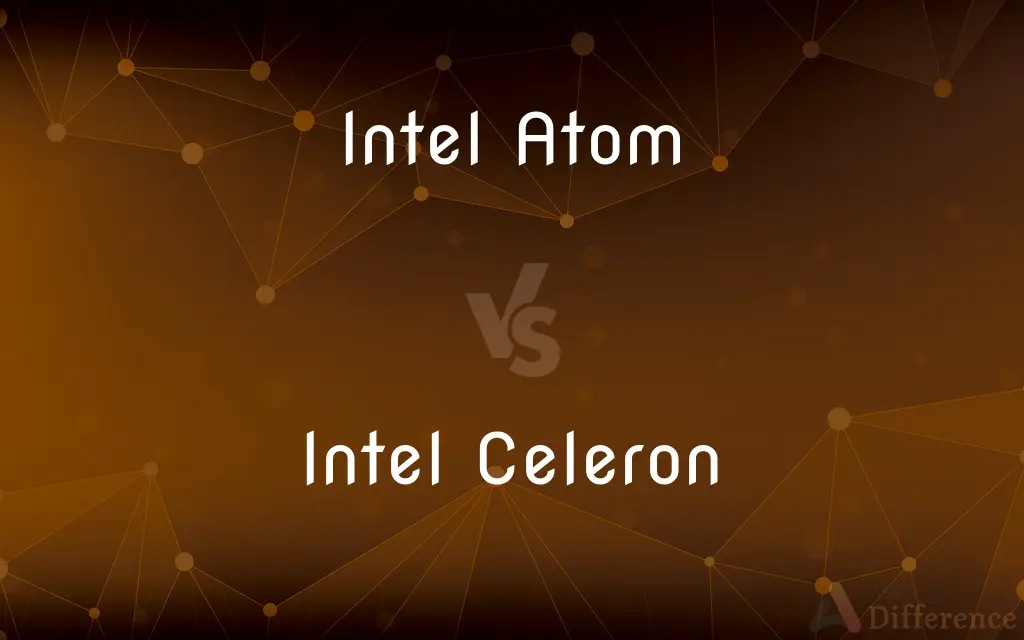Intel Atom vs. Intel Celeron — What's the Difference?
By Tayyaba Rehman — Published on October 30, 2023
Intel Atom is designed for small, power-efficient devices. Intel Celeron targets budget PCs with basic performance needs. Both are Intel processors but serve different markets.

Difference Between Intel Atom and Intel Celeron
Table of Contents
ADVERTISEMENT
Key Differences
Intel Atom: Intel Atom processors emphasize power efficiency, making them ideal for portable devices, like tablets and compact laptops. Meanwhile, Intel Celeron is intended for more traditional computing environments, but the focus remains different.
Intel Celeron: Celeron processors are developed as a budget-friendly alternative to Intel's higher-tier CPUs. They offer basic computing capabilities, making them suitable for everyday tasks, such as web browsing or document editing. Intel Atom, conversely, is more focused on conserving energy and space.
Performance: Typically, Intel Celeron processors provide better performance compared to Atom processors due to their architecture and targeted use-cases. While Intel Atom prioritizes low power consumption, Intel Celeron leans more towards delivering a balance between performance and price.
Usage Scenarios: Devices powered by Intel Atom processors are often found in compact and mobile platforms, where battery life and portability are paramount. In contrast, Intel Celeron processors are frequently seen in budget desktops and laptops where affordability is key.
Evolution: Over the years, Intel has refined and updated both the Atom and Celeron lineups. While their core philosophies remain consistent, technological advancements have led to improvements in both series. Nevertheless, the distinction between Intel Atom's energy efficiency and Intel Celeron's budget-friendly performance remains.
ADVERTISEMENT
Comparison Chart
Primary Focus
Power efficiency
Budget-friendly performance
Typical Devices
Tablets, compact laptops
Budget desktops and laptops
Performance
Optimized for energy conservation
Balanced for everyday tasks
Price Point
Typically lower due to device type
Affordable, lower than Intel's premium lineups
Market Segment
Mobile and compact devices
Traditional computing with basic needs
Compare with Definitions
Intel Atom
Known for conserving energy.
The Intel Atom is ideal for devices needing extended uptime on a single charge.
Intel Celeron
Provides standard performance for everyday use.
The Intel Celeron in my desktop handles web browsing and word processing well.
Intel Atom
Designed for mobile and compact devices.
Many compact laptops use an Intel Atom to stay slim and light.
Intel Celeron
A staple in Intel's lineup for cost-conscious buyers.
Businesses often buy Intel Celeron PCs in bulk for office tasks.
Intel Atom
Intel's solution for portable computing needs.
For those prioritizing portability, the Intel Atom is a reliable choice.
Intel Celeron
An affordable alternative to premium CPUs.
If you're looking to save money on a PC, consider one with an Intel Celeron.
Intel Atom
A processor line prioritizing power efficiency.
The tablet boasts a long battery life thanks to its Intel Atom processor.
Intel Celeron
Targets consumers needing basic computer functions.
For students on a budget, an Intel Celeron laptop might be a good choice.
Intel Atom
Typically found in smaller form factor devices.
This pocket-sized PC runs on an Intel Atom, allowing for its diminutive size.
Intel Celeron
A budget-friendly Intel processor series.
For basic computing tasks, the laptop's Intel Celeron should suffice.
Common Curiosities
For what type of devices is Intel Atom best suited?
Intel Atom is best for compact, power-efficient devices like tablets.
Can I upgrade my Intel Celeron laptop to a more powerful Intel CPU?
It depends on the motherboard's compatibility and the laptop's design.
Which has better battery life, a device with Intel Atom or Intel Celeron?
Generally, Intel Atom devices have better battery life due to their power efficiency.
Are Intel Celeron processors slow?
They're designed for basic tasks; for intensive applications, they might lag behind higher-tier CPUs.
Can Intel Celeron laptops run video editing software?
While possible, the experience might not be smooth due to the CPU's limitations.
Is Intel Celeron suitable for gaming?
Intel Celeron can handle basic games, but it's not designed for intensive gaming.
Are Intel Atom devices typically fanless?
Many are, due to their low heat output and the emphasis on compactness.
Can I run Windows on an Intel Atom tablet?
Yes, many Windows tablets use Intel Atom processors.
How do Intel Atom processors achieve their power efficiency?
They use a streamlined architecture and are optimized for energy conservation.
Which is more expensive, Intel Atom or Intel Celeron?
Prices vary, but generally, Intel Celeron devices might be pricier due to their larger form factors.
Are Intel Atom and Intel Celeron suitable for professional graphic design?
Both are not ideal for such tasks; a higher-tier CPU would be recommended.
How do Intel Celeron processors compare to Intel Pentium?
Both are budget-friendly, but Pentium often offers slightly better performance.
Is Intel Atom suitable for server applications?
Generally not; servers usually require more powerful and robust processors.
Is Intel Celeron good for online classes and basic office work?
Yes, Intel Celeron is suitable for such tasks.
Do Intel Atom processors have integrated graphics?
Yes, they typically come with basic integrated graphics.
Share Your Discovery

Previous Comparison
Animately vs. Animatedly
Next Comparison
Siberian Ginseng vs. Korean GinsengAuthor Spotlight
Written by
Tayyaba RehmanTayyaba Rehman is a distinguished writer, currently serving as a primary contributor to askdifference.com. As a researcher in semantics and etymology, Tayyaba's passion for the complexity of languages and their distinctions has found a perfect home on the platform. Tayyaba delves into the intricacies of language, distinguishing between commonly confused words and phrases, thereby providing clarity for readers worldwide.













































